| Srl | Item |
| 1 |
ID:
130188
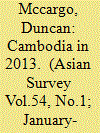

|
|
|
|
|
| Publication |
2014.
|
| Summary/Abstract |
Cambodia in 2013 was dominated by close-fought national elections on July 28, only narrowly won by the ruling Cambodian People's Party after an unexpectedly strong showing by the opposition. Generational change was a major theme of the year, seen in the growing activism of youth and the deaths of several prominent figures.
|
|
|
|
|
|
|
|
|
|
|
|
|
|
|
|
| 2 |
ID:
078524
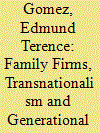

|
|
|
| 3 |
ID:
181197
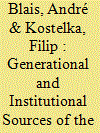

|
|
|
|
|
| Summary/Abstract |
Why has voter turnout declined in democracies all over the world? This article draws on findings from microlevel studies and theorizes two explanations: generational change and a rise in the number of elective institutions. The empirical section tests these hypotheses along with other explanations proposed in the literature—shifts in party/candidate competition, voting-age reform, weakening group mobilization, income inequality, and economic globalization. The authors conduct two analyses. The first analysis employs an original data set covering all post-1945 democratic national elections. The second studies individual-level data from the Comparative Study of Electoral Systems and British, Canadian, and US national election studies. The results strongly support the generational change and elective institutions hypotheses, which account for most of the decline in voter turnout. These findings have important implications for a better understanding of the current transformations of representative democracy and the challenges it faces.
|
|
|
|
|
|
|
|
|
|
|
|
|
|
|
|
| 4 |
ID:
104358
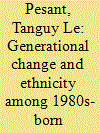

|
|
|
|
|
| Publication |
2011.
|
| Summary/Abstract |
This paper aims to show that Taiwanese born in the 1980s constitute a "post-reform" generation whose perception of cultural difference and ethnicity may challenge the efficiency of the "four major ethnic groups" categorization as an analytical framework for research on Taiwanese youth's identity, political behaviour and social interactions. Using quantitative data from a questionnaire distributed in 15 universities nationwide in 2010 and qualitative data from interviews, this paper first focuses on the attitudes of Taiwanese born in the 1980s toward what are generally considered the three core elements of ethnic group-making in a Chinese socio-cultural context: patrilineality, locality and language. Then it shows that the combined effects of democratization, Taiwanization and contacts with mainland China have decisively impregnated their life experiences and influenced their perceptions of cultural difference. Consequently, the different aspects/ factors that contributed to the formation and the deepening of ethnic boundaries and ethnic conflict up until the 1990s are not effective anymore, nor are they significant for Taiwanese in their twenties. This process is transforming ethnicity rather than erasing it. Thus "having an ethnic identity" is still considered important by a majority, but its meaning and salience have changed, leading to the necessity to redefine, a process that could be undertaken using the concept of "symbolic ethnicity".
|
|
|
|
|
|
|
|
|
|
|
|
|
|
|
|
| 5 |
ID:
095897
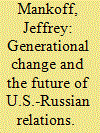

|
|
|
|
|
| Publication |
2010.
|
| Summary/Abstract |
The Cold War has now been over for nearly two decades. In that time, a whole generation has grown up, both in the United States and Russia, with no memory of the conflict that defined world politics for half a century. Not only do today's college students have no memory of even the final stages of the Cold War, many were not even born when the Soviet Union collapsed at the end of 1991. For an ever increasing share of young people in both countries, seminal events from the Cuban missile crisis to Ronald Reagan's stirring call to "tear down this wall" occupy approximately the same place in individual historical consciousness as the assassination of Archduke Franz Ferdinand or the Battle of Waterloo. That observation may seem obvious, but it has profound implications for the future course of relations between the two former Cold War rivals.
|
|
|
|
|
|
|
|
|
|
|
|
|
|
|
|
| 6 |
ID:
142445
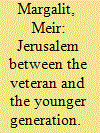

|
|
|
|
|
| Summary/Abstract |
It is time for generational change in the Israeli peace camp, with the old guard’s insights about why it failed to win public support for a peace agreement.
|
|
|
|
|
|
|
|
|
|
|
|
|
|
|
|